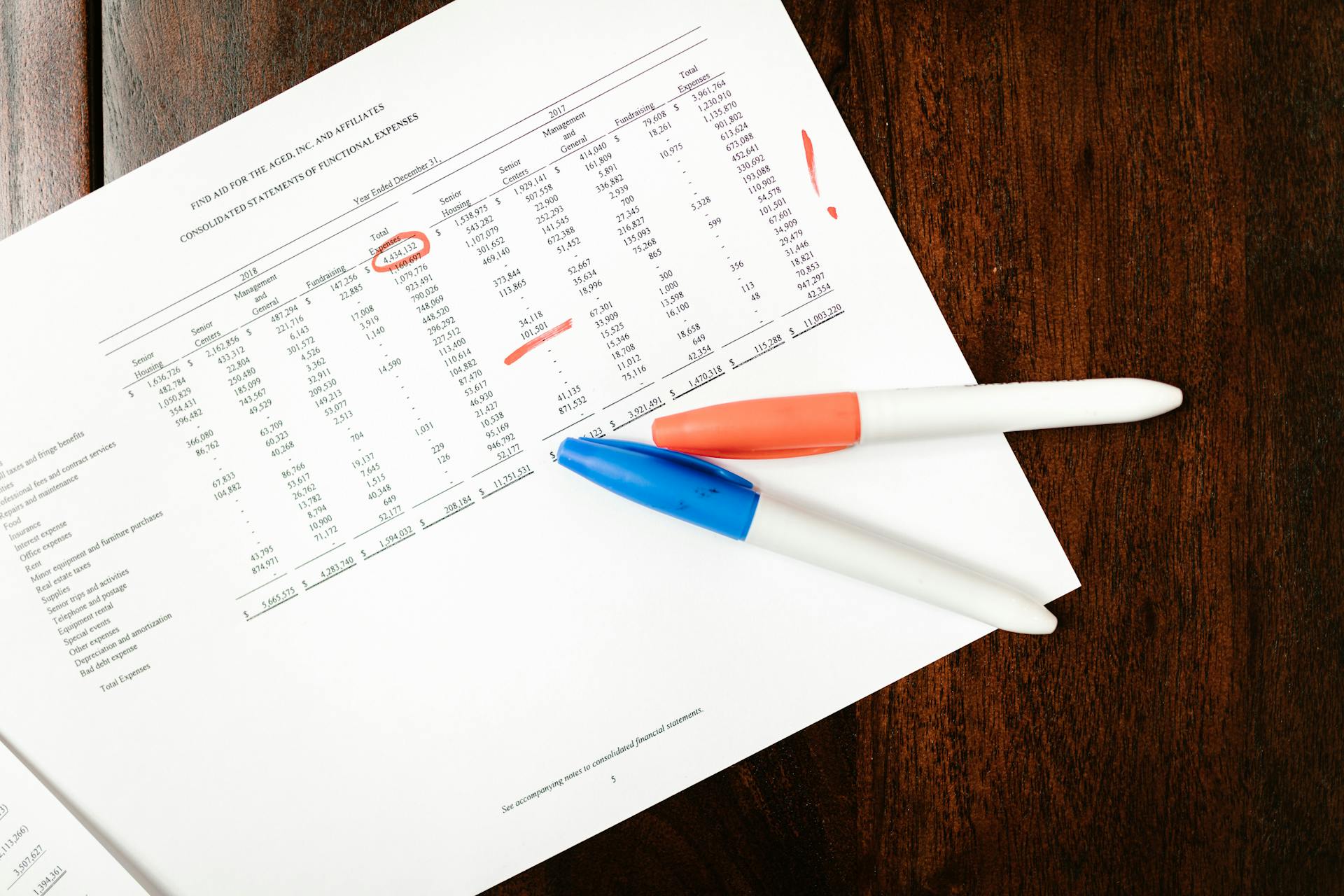
Accruals and prepaid expenses are two important concepts in accounting that help businesses accurately record their financial transactions. Accruals refer to expenses that have been incurred but not yet paid, such as utility bills or rent.
Prepaid expenses, on the other hand, are payments made in advance for goods or services that have not yet been received, like insurance premiums or rent deposits. These concepts are crucial in maintaining accurate financial records.
Accruals and prepaid expenses can be complex, but understanding them is essential for businesses to make informed financial decisions. By accurately recording these transactions, businesses can ensure they are in compliance with accounting standards.
Accruals and prepaid expenses can be recorded using the accrual method of accounting, which matches revenues and expenses with the period in which they are earned or incurred.
Discover more: An Example of Deferred Revenue Is Unearned Rent
What Are Accruals and Prepaid Expenses?
Accrued expenses are expenses recognized when they are incurred but not yet paid in the accrual method of accounting. This means that even though you haven't paid for something, you still need to record it as an expense.
Accrued expenses can include utility bills, salaries, and goods and services consumed but not yet billed. These expenses become a company liability for cash payments in the future.
Typical examples of accrued expenses include paying a February utility bill in March, or delivering products to customers in May and receiving the payment in June.
What Is an Accrual?
An accrual is a concept in accounting that recognizes expenses when they are incurred, even if the cash has not been paid yet. Accrued expenses are essentially a promise to pay for something in the future.
In accrual accounting, expenses are recorded in the period they are incurred, not when the cash is paid. This means that if a company pays its February utility bill in March, the expense is recorded in February, not March.
Accrued expenses are also known as accrued liabilities, and they become a company's liability for cash payments in the future. This is because the company has already incurred the expense, but hasn't paid for it yet.
See what others are reading: Is Depreciation a Non Cash Expense
Typical examples of accrued expenses include utility bills, salaries, and goods and services consumed but not yet billed. These expenses are recorded in estimated amounts, which may differ from the actual cash amount paid or received later.
Accrued expenses are an important aspect of accounting, as they help businesses accurately reflect their financial position and performance. By recognizing expenses when they are incurred, businesses can make informed decisions about their financial resources and obligations.
For more insights, see: Difference between Financial Accounting and Management Accountant
What Is a Prepaid Expense?
A prepaid expense is a payment made for goods or services that will be received or used in the future.
Prepaid expenses can include things like insurance premiums paid in advance to cover the next six months, rent paid at the beginning of the month, or supplies purchased but not consumed by the end of the accounting period.
Some examples of prepaid expenses are:
- Insurance premiums paid in advance to receive coverage for the next six months
- Rent paid at the beginning of the month for that month
- Supplies purchased but not consumed by the end of the accounting period
Prepaid expenses are recorded as assets on a company's balance sheet because they reflect expenditures for future benefits.
Key Differences and Decision Factors
Accrual accounting provides a more accurate financial picture compared to the cash basis method.
The accrual method better matches revenue and expenses, allowing for a more comprehensive view of a company's financial situation.
Businesses seeking financing or investment should use accrual accounting, as it complies with accounting standards like GAAP.
Accrual accounting captures all assets and liabilities, giving a complete picture of a company's financial position.
However, cash basis accounting may suit very small businesses with minimal inventory and no debt or credit transactions.
Most businesses transition to accrual accounting as they grow, as it provides a more accurate financial picture and is required for financing and investment purposes.
A fresh viewpoint: The Tax Basis of an Asset or Liability Is
Accounts Payable and Prepaid Expenses
Accounts payable refers to goods or services you've received invoices for but have not yet paid. This is a common scenario in business, where you've received the goods or services but haven't settled the bill yet.
Prepaid expenses, on the other hand, represent payments made for goods or services that will be received or used in the future. For example, you might pay insurance premiums in advance to receive coverage for the next six months.
Some examples of prepaid expenses include insurance premiums, rent paid at the beginning of the month, and supplies purchased but not consumed by the end of the accounting period. These types of expenses are recorded as assets on a company's balance sheet because they reflect expenditures for future benefits.
Intriguing read: Why Land Not Depreciated
Accounts Payable vs. Prepaid
Accounts payable is a financial obligation that arises when you receive an invoice for goods or services but haven't paid for them yet. This is a common scenario in business, especially when dealing with suppliers or vendors.
Prepaid expenses, on the other hand, are payments made for goods or services that will be received or used in the future. For instance, you might pay your insurance premiums six months in advance to receive coverage.
Here's a key difference between accounts payable and prepaid expenses: accounts payable is about unpaid costs, while prepaid expenses represent payments for future benefits. This distinction is crucial for financial reporting and tax purposes.
Prepaid expenses are recorded as assets on a company's balance sheet because they reflect expenditures for future benefits. As the benefits are realized over time, portions of the prepaid expense are then recorded as expenses on the income statement.
Here's an interesting read: Account Payable Is Debit or Credit
Are Current Liabilities?
Accrued expenses are indeed current liabilities, representing short-term financial obligations due to outside parties that must be paid within one year.
They meet the definition of current liabilities because they are financial obligations incurred during the current reporting period, payment is owed to an outside party, and they will require payment within one year.
Accrued expenses are more immediate obligations directly tied to the most recent operations, contrasting with long-term liabilities that represent financial obligations that exceed one year.
Some key characteristics that make accrued expenses current liabilities include financial obligations incurred during the current reporting period, payment owed to an outside party, and payment required within one year.
Here's a quick summary of the characteristics that make accrued expenses current liabilities:
- Financial obligations incurred during the current reporting period.
- Payment is owed to an outside party.
- Payment will require within one year.
Financial Statement Presentation
Accrued expenses are recognized on a company's financial statements before the company has paid them, and this is crucial for accurately measuring profitability and financial position during a reporting period.
Accrued expenses represent liabilities and expenses that have been recognized on a company's financial statements, and understanding how they are presented on the balance sheet and income statement is important for assessing a company's financial health.
Accrued expenses are classified as current liabilities on a company's balance sheet, representing financial obligations that must be paid within one year.
Some common examples of accrued expenses that would be presented under current liabilities include interest expense accrued on loans, salaries and wages owed to employees, accrued paid time off, and income taxes owed.
Accrued expenses are matched to the appropriate period in which they were incurred on the income statement through adjusting journal entries at the end of accounting periods.
By recognizing accrued expenses, companies provide a truer representation of all costs incurred during that period, whether paid immediately or owed, enabling financial statement users to better evaluate profitability during the period.
Here are some examples of how accrued expenses are classified on the balance sheet:
Accrued expenses are essential for accurately presenting a company's financial position and profitability, and failing to properly accrue expenses could result in overstated net income during reporting periods when the costs were incurred.
Accurate Financial Statements
Accurate financial statements are crucial for any business, and one key factor in achieving this accuracy is proper accrual accounting. Recording accrued expenses is vital for companies to accurately measure profitability and financial position during a reporting period.
Accrued expenses must be recognized as liabilities on the balance sheet of the appropriate reporting period. Under GAAP, failing to properly accrue and disclose expenses would result in non-compliance with GAAP standards.
Accrued expenses are recognized through adjusting journal entries at the end of accounting periods. This affects the reporting of net income by providing a truer representation of all costs incurred during that period.
Recording salaries earned by employees at year-end needs to be accrued in order to match the expense to the current period when the work was performed. This ensures that both net income and liabilities are accurately stated for that period.
Accrued expenses represent liabilities and expenses that have been recognized on a company's financial statements before the company has paid them. Understanding how accrued expenses are presented on the balance sheet and income statement is important for assessing a company's financial health.
Adhering to GAAP accrual accounting guidelines ensures key stakeholders have an accurate picture of a company’s performance and obligations over a set time period.
Discover more: Prepaid Expenses Gaap
Sources
- https://myusf.usfca.edu/abs/accounting/accruals-and-deferrals
- https://www.coursera.org/articles/accrued-expenses
- https://corporatefinanceinstitute.com/resources/accounting/accrued-expense/
- https://finquery.com/blog/accrued-expenses-guide-accounting-examples-journal-entries/
- https://www.vintti.com/blog/what-is-accrued-expenses
Featured Images: pexels.com


